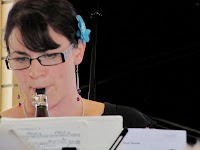
SCUNA presented Bach’s Magnificat and Handel’s Dettingen Te Deum and it got me thinking. The Magnificat is actually the earliest Marian hymn with text from Luke’s Gospel, but in English we can hardly avoid the likeness with the word magnificent which has such common if careless use. So what is magnificent here? I felt the Handel was the “magnificent” one, being outspoken and undiminished and loud and glorious, but really it’s a much simpler work. The Bach is the richer and more complex music and clearly the harder one to perform, with that busily baroque ornamentation and the five soloists. I must listen again but it seemed much more worth the effort. But I loved them both. Megan had a bookgroup mate in the choir and she confirmed the Handel was easier; the Bach was a stretch. But I thought they did worthy justice and the joy of performing such works was clear. The fanfaring trumpets were in the gods, on a balcony above the rest; the soloists to the left came out for their parts; the large choir was arrayed in several rows across the back, behind repetiteur and chamber orchestra and conductor Andrew Koll. The setting was the Anglican church of St Paul’s at Manuka with its impressive organ and large altar area, big enough for all these performers, and bell ringers’ balcony, where the trumpets were located. The annual convention of Australian and New Zealand Association of Bell Ringers, the ANZAB Festival of Bells, had been here for the weekend and I’d heard the eight bells ringing several times but missed the Anzac Day peal. The altar is behind a large arch which I felt may have dulled the sound, but this music is not easily cowered. I particularly enjoyed the elation of timpani and baroque trumpets. A haggard atheist could almost believe God is in this beauty. Certainly Bach and Handel did. I also particularly enjoyed some solo parts: the soprano, of course, because it’s pure and reaches for the Heavens, but also a duo of baritone and alto. At one time, I was stuck by the sinuous melodies outlined by oboe and bassoons. I’d noticed musicians arriving only 10 minutes before the gig, and that looked like cutting it fine. But it all turned out nicely on the night. I felt the orchestra was particularly fine. This is music that oozes joy, and it was just highlighted by hearing SCUNA warm-down by singing their theme in an adjacent room as we departed. A joyous event with music that’s magnificent: Bach’s rich interplay of thoughtful lines and Handel’s sheer forthright declamation and a generous crew to perform it all. Lovely.

 The ANU Choral Society (SCUNA) performed JS Bach Magnificat BWV243 and GF Handel Dettingen Te Deum HMV283 at St Paul’s Anglican Church at Manuka with Director Andrew Koll, Keren Dalzell (soprano), Samantha Lestavel (mezzo-soprano), Julia Wee (alto), Norman Meader (tenor), Nicholas Beecher (baritone), Anthony Smith (repetiteur) and Leanne Bear (orchestra leader).
The ANU Choral Society (SCUNA) performed JS Bach Magnificat BWV243 and GF Handel Dettingen Te Deum HMV283 at St Paul’s Anglican Church at Manuka with Director Andrew Koll, Keren Dalzell (soprano), Samantha Lestavel (mezzo-soprano), Julia Wee (alto), Norman Meader (tenor), Nicholas Beecher (baritone), Anthony Smith (repetiteur) and Leanne Bear (orchestra leader).




































